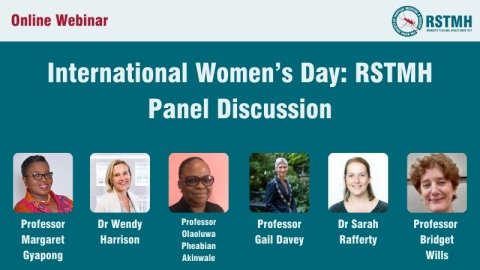International Women's Day: Advice for the next generation

To mark International Women’s Day, RSTMH held a panel discussion with leading female experts in global health and tropical medicine from the RSTMH Board of Trustees.
Chaired by Professor Margaret Gyapong, the current Director of the Institute of Health Research at the University of Health and Allied Sciences in Ghana, as well as the current RSTMH President Elect, the panel answered questions on their experiences as a woman in the global health sector, including on the challenges they faced and the on the mentors that inspired them.
Each of the panel offered their own advice for the next generation of global health experts, who may be starting out in their careers today.
We have summarised their answers below. RSTMH members and Fellows can watch the recording of the webinar in the Members Area here.
Professor Bridget Wills
Professor of Tropical Medicine and Honorary Consultant in Paediatrics, Centre for Tropical Medicine and Global Health, University of Oxford, and Trustee, RSTMH
Professor Bridget Wills offered her advice first, which was to “believe in yourself and to have the courage to believe that you can do whatever it is that you're interested in”.
She said that it is important to try to move forward in whatever way you can with your career goals, but also “to ask people for help”.
She said: “Most people are really willing to help if they can so approach them and ask” and that there are “many people who could help us if we were open to asking for help”. Adding: “Sometimes we're too narrow and too focused in on ourselves, so I would encourage people to look outwardly and ask for help”.
Dr Wendy Harrison
Chief Executive Officer, Unlimit Health, and President Elect, RSTMH
Dr Wendy Harrison’s advice was around “leading in a different way”.
She said that it is important to appreciate that “being authentically you, might well be quite a different style to what you've had before, but can be equally as effective. So don’t feel pressure to act stereotypically.”
She went on to say that we have a duty as women who've got to a certain to level, to champion other women, and also spoke of the importance of giving help when asked, as well as “handing on your power to other women”.
Professor Gail Davey
Professor of Global Health Epidemiology, Brighton and Sussex Medical School, and Trustee, RSTMH
Next up was Professor Gail Davey who, echoing Wendy’s advice, said “Don't feel you have to fit in”, adding that it is important to “believe in yourself”.
She said: “If there are things that you feel really motivated to do then do them, and the career will work itself out somehow.”
Professor Olaoluwa Pheabian Akinwale
Director of NTD Research, and Deputy Director-General, Nigerian Institute of Medical Research, and Trustee, RSTMH
Professor Olaoluwa Pheabian Akinwale was next to give her advice to the next generation.
Her advice was to avoid working in silos, saying that you need a working or research group in order to be efficient and proactive.
She went on to say that she “couldn’t over-emphasize the need for a mentor at the early stage of your research career”.
She added: “We have to strike a balance between being a mother, being a wife, being a daughter and then, being a researcher. So you need to be focused and have a positive attitude.”
Dr Sarah Rafferty
Senior Research Officer: Pandemic Preparedness, Office for National Statistics, and Vice President and Early Careers Trustee, RSTMH
Dr Sarah Rafferty said that she has been fortunate in her career to have had so many mentors to choose from.
She said she has two pieces of advice. The first one is to “find yourself an inspiring female mentor. This could be through a formal scheme, or it could be more informally”. She added, “I think it's so invaluable to have that relationship with someone that's in a senior leadership position very early on in your career.”
Her second piece of advice is to “have confidence and back yourself, because you can achieve anything”.
She said: “You can go for that job, and you can go for that placement. And I think sometimes, and particularly as woman or those that are in marginalized communities, etc., as we've spoken about that lack of confidence. And I think that's something that we can really address.
“That's easier said than done, of course, but it's something that we should be thinking about. Really, back yourself, because you can do it.”
RSTMH members and Fellows can watch a recording of the webinar in the Members Area here.